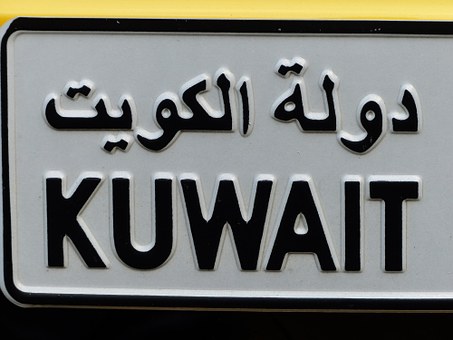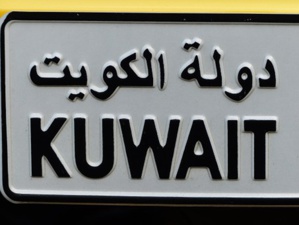On Wednesday, Kuwait’s new emir was sworn in at parliament. The ceremony comes at a time when the country is preparing to lay to rest its late ruler Sheikh Sabah al-Ahmad al-Sabah, who played a significant role in sterring the U.S.-allied Gulf state through some of the Middle East’s most turbulent times.
Kuwait’s cabinet was swift in naming Crown Prince Sheikh Nawaf al-Ahmad al-Sabah as the designated successor following the death of Sheikh Sabah, 91, in the United States where he had been hospitalised in July. His body is scheduled to arrive later todat in Kuwait.
Nawaf, 83, has pledged to work for Kuwait’s prosperity, stability and security following the taking of the oath of office.
“Our dear nation today faces difficult situations and dangerous challenges that can only be overcome ... by unifying ranks and working hard together,” he said while addressing the National Assembly.
Sheikh Sabah’s funeral has been restricted to ruling family members due to concerns coronavirus-induced social restrictions. Pandemic-induced lockdowns have resulted in steep decline of oil prices which has imposed straines on Kuwait’s economy.
In 2006, when the previous emir, Sheikh Jaber al-Ahmad al-Sabah died, thousands of Kuwaitis attended the funeral and many, along with expatriates, lined the streets.
“We honestly feel like we’re gong to be lost without his guidance,” said Fajer, a Kuwaiti woman.
Dignitaries from across the globe paid their last respects to savvy politician, who was widely respected as a humanitarian; he played a significant role in mending ties with Iraq and trying until his death to resolve a bitter Gulf dispute.
Analysts see his death as the end of an era following the rise of younger generation rulers in the region, who have been more aggressive, especially in countries including the United Arab Emirates and in Saudi Arabia; both countries have taken a hawkish stand towards Iran.
“Though the incoming power brokers in neighbouring Gulf countries did not always heed his advice, the Emir was a reminder of an order hard-fought to achieve that was the basis for the goodwill international partners bear the region,” wrote Kirsten Fontenrose, director of the Atlantic Council’s Scowcroft Middle East.
Sheikh Nawaf’s takes the helm in Kuwait, which has the seventh largest oil reserves in the world, at a time when the government is ardently trying to boost the finances of the country where citizens enjoy a cradle-to-grave welfare system.
Analysts do not expect Kuwait’s investment, oil and foreign policy strategy to change under Sheikh Nawaf’s leadership.
According to diplomats and analysts, Nawaf, who lacks his brother’s experience as a conciliator and is likely to focus on domestic matters, including selecting a crown prince who can build consensus in the ruling family and mitigate headwinds coming from a parliament that has often clashed with the government and hindered economic reform efforts.
References:
reuters.com
Kuwait’s cabinet was swift in naming Crown Prince Sheikh Nawaf al-Ahmad al-Sabah as the designated successor following the death of Sheikh Sabah, 91, in the United States where he had been hospitalised in July. His body is scheduled to arrive later todat in Kuwait.
Nawaf, 83, has pledged to work for Kuwait’s prosperity, stability and security following the taking of the oath of office.
“Our dear nation today faces difficult situations and dangerous challenges that can only be overcome ... by unifying ranks and working hard together,” he said while addressing the National Assembly.
Sheikh Sabah’s funeral has been restricted to ruling family members due to concerns coronavirus-induced social restrictions. Pandemic-induced lockdowns have resulted in steep decline of oil prices which has imposed straines on Kuwait’s economy.
In 2006, when the previous emir, Sheikh Jaber al-Ahmad al-Sabah died, thousands of Kuwaitis attended the funeral and many, along with expatriates, lined the streets.
“We honestly feel like we’re gong to be lost without his guidance,” said Fajer, a Kuwaiti woman.
Dignitaries from across the globe paid their last respects to savvy politician, who was widely respected as a humanitarian; he played a significant role in mending ties with Iraq and trying until his death to resolve a bitter Gulf dispute.
Analysts see his death as the end of an era following the rise of younger generation rulers in the region, who have been more aggressive, especially in countries including the United Arab Emirates and in Saudi Arabia; both countries have taken a hawkish stand towards Iran.
“Though the incoming power brokers in neighbouring Gulf countries did not always heed his advice, the Emir was a reminder of an order hard-fought to achieve that was the basis for the goodwill international partners bear the region,” wrote Kirsten Fontenrose, director of the Atlantic Council’s Scowcroft Middle East.
Sheikh Nawaf’s takes the helm in Kuwait, which has the seventh largest oil reserves in the world, at a time when the government is ardently trying to boost the finances of the country where citizens enjoy a cradle-to-grave welfare system.
Analysts do not expect Kuwait’s investment, oil and foreign policy strategy to change under Sheikh Nawaf’s leadership.
According to diplomats and analysts, Nawaf, who lacks his brother’s experience as a conciliator and is likely to focus on domestic matters, including selecting a crown prince who can build consensus in the ruling family and mitigate headwinds coming from a parliament that has often clashed with the government and hindered economic reform efforts.
References:
reuters.com






